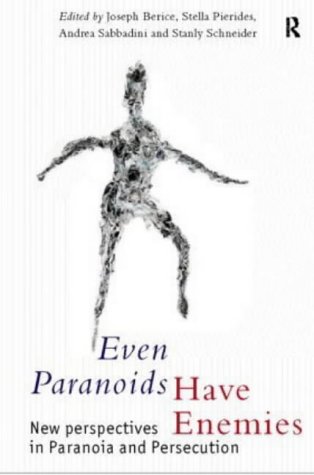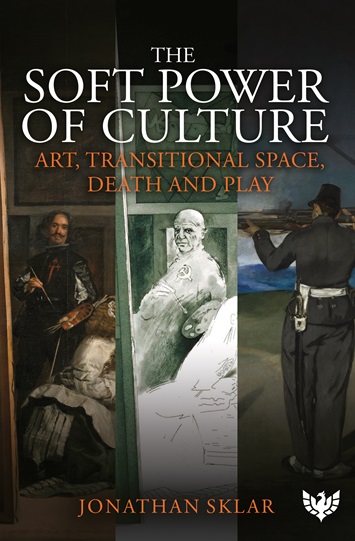Malice Through the Looking Glass: Reflections and Refractions of Envy, Greed and Jealousy: Second Revised Edition

Book Details
- Publisher : Teva Publications
- Published : January 2009
- Cover : Paperback
- Pages : 534
- Category :
Psychoanalysis - Catalogue No : 28330
- ISBN 13 : 9780955276705
- ISBN 10 : 0955276705
Also by Joseph H. Berke
Free UK Delivery over £25
There are currently no reviews
Be the first to review
The looking-glass is a very special mirror which can reflect and refract the deepest recesses of the mind, the utmost corners of the self. It is an instrument which can dazzle and dismay, something to stand apart from as well as step into. This glass provides an opportunity to look and discover basic truths about our inner nature and outer constructions. At propitious moments the resultant images pass beyond a wonderland of fear or self-satisfaction. They reveal the truth about the way we are as well as the way of the world. This book is a looking-glass which allows the reader to explore the darkest components of character and culture, the shadow side of the self. These elements tend to remain within the shadows of perception because they are chaotic, violent, dangerous and highly disturbing. Yet, a knowledge of their presence and of their intricate relations with the acceptable faces of reality, remains an absolute necessity for overcoming the damage that individuals and institutions do to each other. It is the sine qua non for liberating the world from the grip of what collectively may be termed, malice.
Reviews and Endorsements
Malicious hatred is all pervasive, yet it is curiously unfashionable. It is a subject relegated to fiction, while generally ignored by the social sciences. The many manifestations of this kind of hate tend to be ascribed to problems of environment or heredity. The 'yob' who stabs the old lady down the block, or the man who kills his child, 'must' have bad genes. Or maybe their biochemistry has gone haywire. Similarly, acts of outrageous criminality tend to be justified when done in the name of economic inequality, political oppression, or bad weather.
Man himself is the source of the malice against which he is constantly struggling. And it is only possible for him to transcend this basic malignity by knowing how, what, why and when it arises. The alternative is to continue the blind butchery of our environment and fellow creatures which otherwise permeates our lives.
'This is a new edition of an old classic. Careful additions have been made to a book that has never lost its freshness, appeal and relevance. Malice is a feature of the human condition and motivation. This book is the antithesis to a celebration of it, but it is not a condemnation of the human spirit either. It celebrates if anything the survival of the human spirit in the face of malice. It is a source book of fascinating detail of the way people, groups and nations give themselves over wholeheartedly to hatred in all its various forms. The rhetoric of evil has become fashionable in politics and Hollywood, although it is always the evil of the 'other.' What this book commands us to face is that evil is endemic: it is in us, not just in 'them.'
The book's appeal is not by inviting us to wallow in the human misery we create for each other. Rather the plot ends with our survival: love survives. This is not a sentimental 'count your blessings,' or 'accentuate the positive' kind of point. The message is that through arduous effort - the most arduous of all being ruthless self-acceptance - we can come through the rage that life engenders. We may be bruised, torn, and ashamed, but we still acknowledge that the human spirit can achieve benevolence among ourselves. We live, we bleed, we love--all against the specifically human backdrop of malice. This is a book for those who can stomach the gory details of being human; for those who cannot, it is a gentle primer in what you have to discover.'
- Robert Hinshelwood: Member of the British Psychoanalytical Society and the Royal College of Psychiatrists, Professor of Psychoanalysis and the Centre for Psychoanalytic Studies, University of Essex
'This is a fascinating exploration of the darkest components of character and culture. In this brilliant study Dr. Berke examines the origins of malicious feelings and the way that these feelings are expressed in action through forceful, destructive behavior in individuals, families and in society as a whole. Moreover, he addresses a most relevant and timely topic of our age by showing how malice, the embodiment of envy, greed and jealousy, may foster terrorism.'
- Ilany Kogan: Supervising and Training Psychoanalyst, Lecturer and Writing.
'Joseph Berke has, with this book, deepened his inquiry into the vicissitudes of states of envy, a project he began some years ago. His researches offer new food for thought into personal, psychological and social crises associated with these immensely powerful emotions, often poorly discernible, that can wreak havoc in lives everywhere.
The book's range is remarkable. It addresses the 'micro' personal and the 'macro' social dimensions of malice; the smallest intrapsychic 'part objects' and the explosive relations between nation states and cultures. This is a dark subject: however, Berke never abandons his clinical roots to condemn or judge,and as a result, he helps us to learn a great deal about ourselves.'
- Paul Williams: Joint Editor-In-Chief, International Journal of Psychoanalysis.
About the Author(s)
Joseph H. Berke is a psychoanalytic psychotherapist working with individuals and families. He is a lecturer, writer and teacher and has lived in London since 1965. Beforehand he attended Columbia College of Columbia University and graduated from the Albert Einstein College of Medicine of Yeshiva University in New York. Dr Berke moved to London to study with R.D. Laing and assisted in establishing the Kingsley Hall Community. There he helped Mary Barnes, a middle-aged nurse who had been diagnosed with schizophrenia, to pass through a severe regression. Barnes later became a noted artist, writer and mystic. The book which Barnes and Berke co-authored (Mary Barnes: Two Accounts of a Journey Through Madness) was adapted as a stage play and has been performed in many countries. It has now been optioned as a feature film. Dr Berke and colleagues founded the Arbours Housing Association in London in order provide personal, psychotherapeutic care and shelter for people in emotional distress. Later he founded and was the director of the Arbours Crisis Centre. He is the author of many papers and books on psychotherapy, social psychiatry, psychosis, therapeutic communities and transpersonal psychology as well as on Kabbalah and Hassidism.
Customer Reviews
Our customers have not yet reviewed this title. Be the first add your own review for this title.
You may also like
Even Paranoids Have Enemies: New Perspectives in Paranoia and Persecution
Joseph H. Berke
Price £36.99
Why I Hate You and You Hate Me: The Interplay of Envy, Greed, Jealousy and...
Joseph H. Berke
Price £35.99
The Soft Power of Culture: Art, Transitional Space, Death and Play
Jonathan Sklar
Price £26.99
save £3.00








